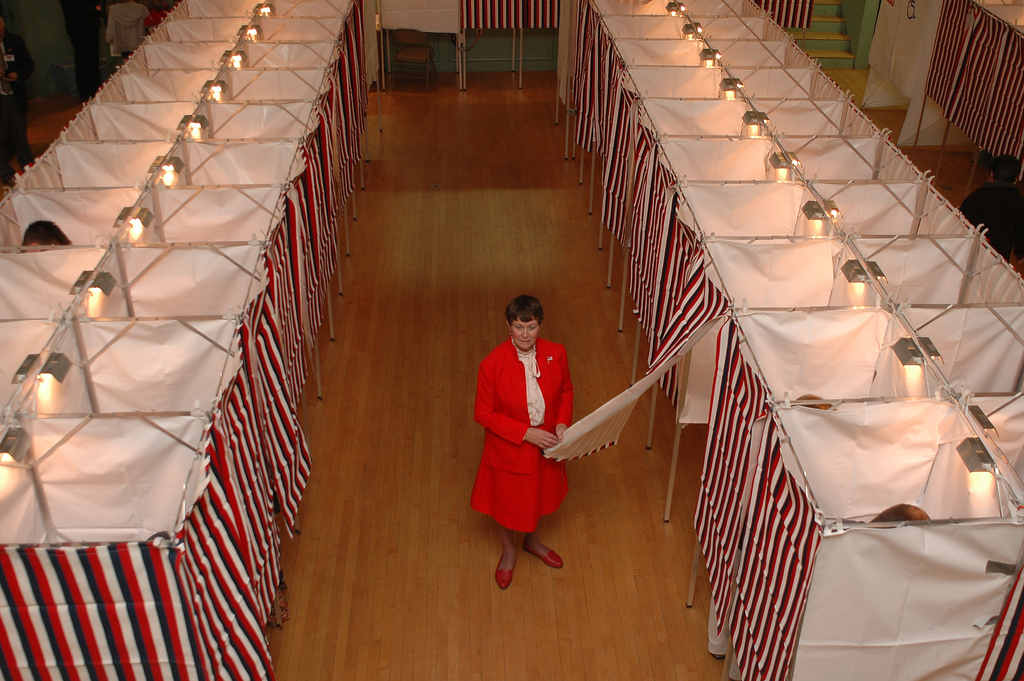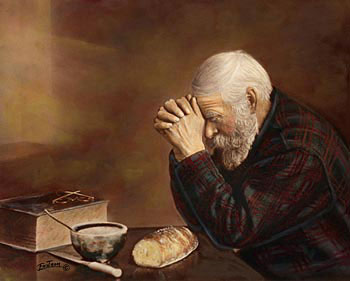 I recently gave a presentation at a local parish outlining some of the key concepts provided by the U.S. Catholic bishops in their document Forming Consciences for Faithful Citizenship, published every four years as a guide for Catholics preparing for the elections. I talked about how the bishops insist we have a duty to resist evils such as abortion, racism, and euthanasia, but also a duty to promote the common good, for example by protecting the environment and ensuring that the basic needs of all are met. I also waded into the thorny issue of cooperation of evil, distinguishing between voting for a candidate who supports a grave evil because of their stance on that issue and voting for them despite their position on that issue for other grave reasons. And I discussed how the bishops point to the virtue of prudence as crucial for voters.
I recently gave a presentation at a local parish outlining some of the key concepts provided by the U.S. Catholic bishops in their document Forming Consciences for Faithful Citizenship, published every four years as a guide for Catholics preparing for the elections. I talked about how the bishops insist we have a duty to resist evils such as abortion, racism, and euthanasia, but also a duty to promote the common good, for example by protecting the environment and ensuring that the basic needs of all are met. I also waded into the thorny issue of cooperation of evil, distinguishing between voting for a candidate who supports a grave evil because of their stance on that issue and voting for them despite their position on that issue for other grave reasons. And I discussed how the bishops point to the virtue of prudence as crucial for voters.
As useful as these concepts are, however, I cannot help but feel that by themselves they are not completely helpful in guiding Catholics through this year’s unprecedented presidential election; while they address real moral concerns Catholics face in the voting booth, they do not really respond to the dis-ease that many Catholics, indeed many Americans, feel in 2016. I think that looking back on how the bishops have addressed the elections over the past forty years can provide a helpful context for how the bishops, and Catholics more generally, can approach the issue of faithful citizenship going forward in a way that better responds to this dis-ease.
While writing an essay that will be published next year, I had the chance to read all of the U.S. Catholic bishops’ teaching documents on faithful citizenship going back to the original, Political Responsibility, published in 1976. Although naturally there are commonalities running through all of them, there is also a significant shift in their focus and tone over the years. Although this is something of a simplification (read the essay when it is published!), these documents have gone through three distinct stages. The documents in each of these periods emphasize important aspects of how Catholics should think about political life, responding to the urgencies and dilemmas of each period of time.
The bishops’ first document, Political Responsibility, was written in the wake of the Watergate scandal, and it seeks to encourage Catholics to engage in civic participation out of a sense of, as the title suggests, moral and civic responsibility. It calls for a renewal of civic life to revive Americans’ trust in the democratic process. This theme remains central to subsequent documents well into the 1980s. The documents of this period also focus on the need for Catholics to collaborate with their non-Catholic neighbors in pursuit of the common good. In the aftermath of the Second Vatican Council, the bishops urge Catholics to engage the political realm with a new sense of maturity and a spirit of cooperation.
These earliest documents, however, lacked an overarching moral vision, focusing instead on a number of specific policies important to the bishops. In the voting document published prior to the 1988 elections, the bishops make their first reference to “the consistent ethic of life,” a concept introduced by Cardinal Joseph Bernardin of Chicago in 1983. The consistent ethic of life gave the bishops an overarching vision to link their policy priorities, and indeed in the documents after 1988 the focus is on transforming the nation’s political vision toward greater respect for the dignity of the person. The bishops express a hope that members of both parties, Democrats and Republicans, can move their parties in the direction of the consistent ethic.
By the mid-1990s, it was becoming increasingly clear that political partisanship had become a stronger force that the bishops anticipated, and that both liberals and conservatives were wedded to positions in opposition to Catholic teaching. Whereas in earlier years there was an optimistic sense that Catholics could make a positive difference politically, by the 1990s the sense was that Catholics were politically homeless. Indeed, it was increasingly the case that the Catholic Church in the United States was divided along partisan lines, with political allegiances increasingly associated with ecclesiological differences over authority in the church, the liturgy, etc. Beginning with the document published prior to the 2000 election, then, the bishops put greater emphasis on their authority as teachers of the faith, reflecting a fear that Catholics have put partisan loyalties ahead of their identity as “Catholic.” The documents in this latter period focus on maintaining Catholic identity in a pluralistic, divided society and place a great deal of emphasis on conscience, cooperation with evil, and intrinsic evils, an emphasis reflected in the current title for these documents, Forming Consciences for Faithful Citizenship.
In the 2016 elections, however, Americans have experienced a palpable dis-ease with the democratic process itself. Both major political parties experienced serious challenges to their respective “establishments,” and the Republicans’ anti-establishment candidate, Donald Trump, won the nomination. Many voters have the sense that the parties are out of touch with their concerns, or abandon them once ensconced in Washington. Throughout both the primaries and the general election, concerns have been raised about the election itself being “rigged.” Finally, for many voters the character of both of the major presidential candidates overshadows the policy issues at stake, raising concerns that only a broken political process could leave us with such limited choices.
It seems to me that Forming Consciences for Faithful Citizenship does not provide the resources necessary to face these problems, as valuable as its teaching is. That being the case, I think the Catholic Church has much to learn from the earlier election documents, particularly those from the earliest period. Despite the important differences in context, these earlier documents were written in a period where the American people faced a similar crisis of confidence in their elected leaders and the democratic process, after the debacle of the Vietnam War, the disgrace of Watergate, and the uncertainty of the economic crises of the 1970s. Going forward, I believe the U.S. bishops should put as much emphasis on how Catholics can contribute to rebuilding our civic culture and trust in democratic institutions as they do on how Catholic voters can vote consistently with their values. Here are a few recommendations.
The outsized influence of wealthy individuals and corporations on campaign finance and the setting of legislative agendas is one of the leading reasons for people’s disillusionment with the democratic process. The bishops should take a forceful stand on campaign finance reform. Although it would be inappropriate for them to make very specific recommendations on policy, campaign finance reform is clearly consistent with a commitment to the common good and a preferential option to hear the voices of the poor. At an even more basic level, the bishops could address the question of corruption among elected officials. As the case of former Governor Bob McDonnell in my own state of Virginia illustrates, there is a dangerous gray area when it comes to the proper relationship between elected officials and donors or benefactors.
As this year’s election campaigns have shown, there is also room for improvement in both the primary process and the nominating process. Of course it would be inappropriate for the U.S. bishops to make specific recommendations on how the political parties should nominate their candidates, but they could encourage the parties to make the processes more transparent, democratic, and encouraging for enthusiastic but inexperienced voters and activists.
As important as these reforms of the electoral process are, however, it seems to me that the much graver problem is our cultural commitment to public deliberation and democratic institutions, and it is here that the U.S. bishops could play a particularly important role, in appealing to a sense of civic virtue and commitment to the common good. I want to emphasize a couple of areas of particular concern.
The political scientists Thomas E. Mann and Norman J. Ornstein have made the case that American conservatism has evolved into an anti-government ideology more concerned with torpedoing any meaningful legislation than with compromising for the sake of good governance. Conservatives have long contrasted the supposed inefficiency and ineptitude of the government compared to the private sector, and taken to its extreme this line of argument creates a self-fulfilling prophecy in which viable government efforts are undermined by insufficient funding or poor leadership. But the attack on government has also been an attack on governmental officials, who have been painted with broad strokes as venal, incompetent, and corrupt. And this creates another self-fulfilling prophecy in which talented, virtuous individuals avoid public service, and in particular elected office.
The bishops could make a powerful case for the nobility of public service. As Pope Francis declared in his speech to the United States Congress, politics is a vocation “to defend and preserve the dignity of your fellow citizens in the tireless and demanding pursuit of the common good, . . . to satisfy common needs by stimulating the growth of all its members, especially those in situations of greater vulnerability or risk.” This is not a partisan statement: there is room for disagreement about where the state, the market, and community engagement can make the best contributions. But the bishops can help build a consensus that we are better off when our public servants recognize a greater calling to the common good, and when the public respects this calling.
Another problem that impacts our civic life is the pervasiveness of the consumerist mindset. Here I am not just talking about economic behavior, but rather a mindset that expects to have reality tailor-made to our individual preferences, whether it is the products we buy, the entertainment we consume, or the information to which we are exposed. The sociologist Zygmunt Bauman refers to the phenomenon of “the privatization of the public,” the transformation of the public sphere into an arena for the self-expression of our private selves. The paradox here is that the public sphere is by definition not amenable to customization to our personal preferences because of the presence of that pesky reality, the Other. And the consumerist mindset, the privatization of the public, leaves us ill-equipped to engage in civic life and address issues of public concern: we live in “epistemic bubbles” of news and social media, unaware of the views of others or of facts that challenge our cherished viewpoints; we are averse to dialogue and compromise; we distrust institutions, in which we often don’t get our way and have to patiently work to get results.
Again, I think the Catholic Church is particularly well-suited to help create a new public space in which we can revive the habits of civic participation. The sociologist José Casanova provides several examples of how religious groups have embraced a public presence and transformed the public square. As it is, however, I think the current version of the Forming Consciences for Faithful Citizenship document unintentionally contributes to the problem. Focusing on the formation of conscience so that Catholic voters can be true to their Catholic identity is vital, but this has to be balanced by a sense that one crucial aspect of that Catholic identity is a commitment to the common good in a pluralistic society. For example, it may be surprising to discover that beginning with the document produced for the 2004 election, the bishops make no serious reference to Catholics collaborating with others in pursuit of the common good.
On many occasions during this election cycle I have heard Catholics make the case that they can vote for neither major party presidential candidate because neither is consistent with their Catholic values. There are certainly valid reasons for withholding one’s vote or voting for a third party, but I wonder if voting has become too much of an individualistic expression of “Catholic identity” rather than participation in a collective decision-making process in pursuit of the common good. It is simply unreasonable to expect, in a pluralistic society like our own, for there to be candidates or parties that fully embody our values as Catholics, so the proper question shouldn’t just be which candidate fully reflects my Catholic values, but also how can I as a Catholic best work with my fellow citizens to promote the common good, despite our serious disagreements. I think if the bishops really want to respond to the dilemmas facing American Catholic voters, then, they need to devote significant attention to the question of promoting the virtues of civic life such as dialogue, compromise, and institution-building, while continuing to insist on the invaluable teachings found in Forming Consciences for Faithful Citizenship.






These points are all excellent, Matthew, and much needed. Thank you for this collection of insights; I look forward to reading your larger essay!
I might make one minor objection, however, that bears more immediately upon the present election. If you are right that (1) we desperately need to “create a new public space in which we can revive the habits of civic participation,” and (2) some components of our current political infrastructure (the ones that perpetuate the power-peddling, corruption, privatization, and partisan obstructionism that you mention) have deep incentives to actively stand athwart such a renovation of our civic culture, THEN wouldn’t withholding one’s vote from both major party candidates in any given race be a natural, or at least a common consequence of resisting those very forces that have a vested interest in preserving the current deterioration of authentic public discourse and cooperation on behalf of the common good?
In other words, if the pathologies you diagnose so well here are in fact INSTITUTIONALIZED such that the two major parties are not only willing participants in them but active promoters of them, then wouldn’t resistance in the form of abstention or 3rd-party voting be an appropriate response to them? In some ways, I actually think that the argument that one almost has a duty to “make their vote count” but opting for one of the major candidates (usually for the sake opposing the threat pose by the other one) plays right into the sort of individualism you rightly caution against in so far as it allows citizens to think that they are really “doing something”– actively participating in some important public activity– and so gives them the satisfaction that need not do anything ELSE. In that situation, which I think is all too common, the end result is that voters mistake stepping into a curtained booth and confidentially selecting their individual preferences (and on the surface of it, what could be a more privatized and individualistic act than that?) for actual civic participation in public discourse.
If, on the other hand, Catholics were to call into question their being prodded down the cattle shoot of HAVING to choose between one of two suspiciously similar political options, wouldn’t that have the natural effect of inciting them to evaluate what other options are available (and morally obligatory) for political action that builds up the common good? Given the current political environment, shouldn’t the Church be saying above all that- even if you do vote for one of the two “realistic” candidates- it is not ENOUGH simply to make your individual selection in the voting booth. The civic deterioration around us demands that we not be satisfied with regarding voting as a sufficient means of political participation and everything else as “supererogatory.”
If we Catholic do not more seriously consider abstention or voting 3rd party as a means of resisting the current political machine, I am afraid that it will be the same old story every time around: and ethics of “supreme emergency” forcing everyone to opt for one or another of the fully bought-off, fully implicated, and fully invested status quo candidates. In that scenario, I simply do not see how any meaningful reform can break through.